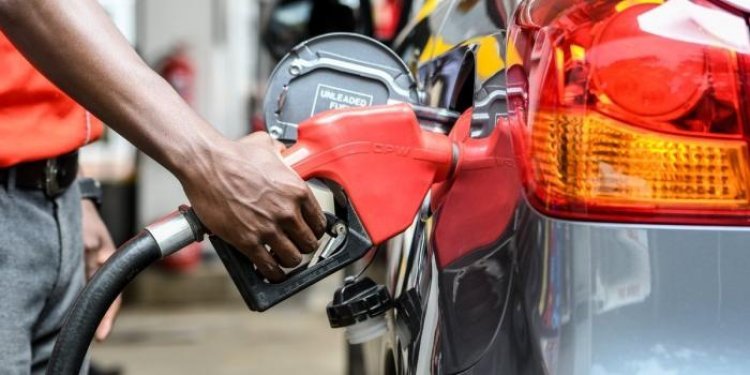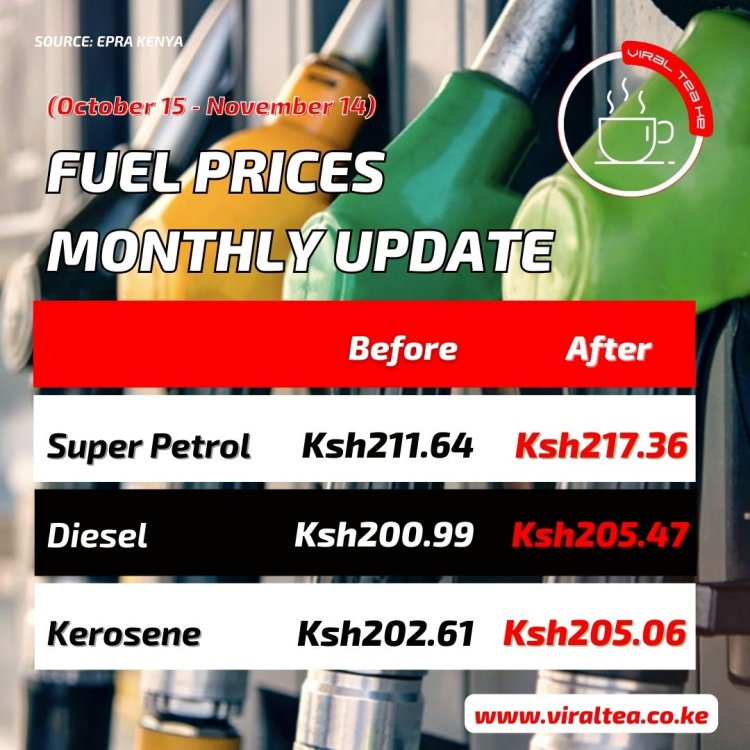How EPRA's October Increase In Fuel Prices Was Almost Predicted Correctly
A user named Wangari M on the social media platform X (formerly Twitter) predicted that the authority would increase fuel prices for the period between Sunday, October 15 and Tuesday, November 14,

The latest increase in the cost of fuel as announced by the Energy and Petroleum Regulatory Authority (EPRA) on Saturday, October 14 pushed the prices to new record highs in Kenya, but little is known of a prediction beforehand that was almost accurate.
A user named Wangari M on the social media platform X (formerly Twitter) predicted that the authority would increase fuel prices for the period between Sunday, October 15 and Tuesday, November 14, the second month in a row that the prices increased.
She was responding to a report by The Spectator Index, a popular X account and website run by Abdul-Latif Halimi, a doctor from Melbourne, Australia, which posted that oil prices on Saturday, October 7 recorded their biggest weekly decline in over six months.

New fuel prices as announced by EPRA on October 14, 2023. /VIRALTEAKE
Wangari wrote, "EPRA on 14th: petrol, diesel and kerosene prices to increase by 5 shillings per litre, due to a decline in global crude oil prices."
EPRA on 14th: petrol,diesel and kerosene prices to increase with 5 shillings per litre, due to decline in global crude oil prices. https://t.co/CMHjOsUzKg — wangari M (@wangari_mm) October 7, 2023
Just as she had predicted, EPRA did raise the prices of Super Petrol, Diesel and Kerosene. However, she narrowly got the increase by Ksh5 correct as the prices increased by Ksh5.72 per litre, Ksh4.48 per litre and Ksh2.45 per litre respectively for the three fuel products.
Wangari's post on October 7 was viewed more than 80,500 times by the time of publishing this article, with netizens praising her 'prophetic' skills and some seeking her response to the outcome of their future plans.
Super Petrol, Diesel and Kerosene as of now retail at Ksh217.36, Ksh205.47 and Ksh205.06 respectively up from Ksh211.64, Ksh200.99 and Ksh202.61 the previous month.
It is important to note that Kenya imports all its petroleum product requirements in refined form, which makes the country susceptible to fluctuations in global oil prices and international market dynamics. These price increases come at a time when Kenyans are already grappling with the rising cost of living, including soaring food prices and increased electricity tariffs.
Usually, the change in fuel prices is a ripple effect, with any increase in fuel prices triggering possible increases in the cost of matatu fares, food, transportation and power generation operational costs, which include the transportation and logistics sectors, which are vital for the distribution of goods across the country.
However, EPRA stated that the government used the Petroleum Development Levy (PDL) to cushion Kenyans from paying even higher fuel prices. The levy is among the nine taxes imposed on petroleum products.
According to the utility firm, Super petrol had been projected to increase by Ksh8.79 per litre, Diesel by Ksh16.12 per litre and Kerosene by Ksh12.05 per litre.
This means that Super Petrol would have cost an average of Ksh220,43, Diesel retailing at Ksh217.11, and Kerosene cost Ksh214.66 per litre.
"In order to cushion consumers from the spike in pump prices as a consequence of the increased landed costs, the Government has opted to stabilize pump prices for the October - November 2023 pricing cycle," EPRA stated.
"Oil Marketing Companies (OMCs) will be compensated for the under-recovery of costs from the Petroleum Development Levy (PDL) in line with the PDL, Order of 2020."

EPRA Director General Daniel Kiptoo speaking in a speech on July 15, 2021. /EPRA

 admin
admin 




